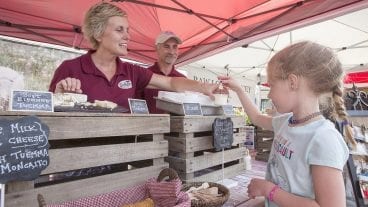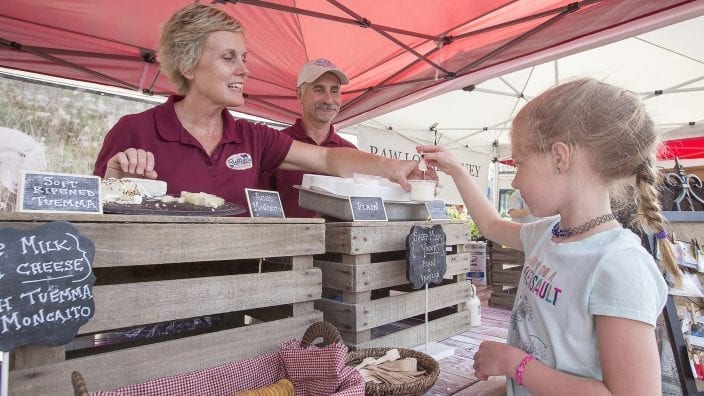Farmer’s Guide to Trucking Regulations available to Ohio Farm Bureau members
The guide includes a farm driver checklist, overview of state and federal regulations and exemptions, CDL qualifications and more.
Read More
Here we go again… someone else blaming cows for global warming.
This is a topic that keeps popping up and this time it’s a burger joint. Yep, you read that correctly. A company that exists by selling hamburgers and fries decided to run a video campaign on social media that it claims is an effort to improve the environment.
And if you have ever spent any time around cows you know that with this efficient digestive system comes methane production — aka, burping, farting and manure.
There are almost 97 million cattle in the U.S. and worldwide about 1.5 billion. Statistically they release between 70 to 120 kilograms of methane per year. This is equivalent to 2,300 kilograms of CO2 emissions each year. That does seem like a lot when there is pressure to keep greenhouse emissions as low as possible.
The first question that came to my mind is what percentage of the total greenhouse emissions is from cows? The sources I found stated that 8% to 9% of the U.S. greenhouse gas emissions come from agriculture. According to EPA, all livestock accounts for just over 2.5% of total U.S. greenhouse gas emissions.
Agricultural research never stops. Scientists and farmers are always looking for new and better ways to meet the food needs of the U.S.
The research the burger joint used to springboard its offensive video is being conducted by the University of California-Davis and the Autonomous University in Mexico. Their feed-additive research focused on adding lemongrass to the diet of cattle to reduce the production of methane.
Statements from UC-Davis indicate at this time, the results of the study are inconclusive to somewhat promising but have yet to be finished or published. And scientists were upset that their research was twisted into the video the way it was.
You are probably thinking, “What was in the video?” Admittedly, I only watched it once because it really made me angry.
The video begins as a young cowboy guitar player emerges out of the back end of a cow and starts singing about cow farts and the environment. It was appalling.
Dr. Frank Mitlowhner commented what he thought on Twitter: “It’s Not. The Cow Farts. Nearly all enteric methane from cattle is from belching. Suggesting otherwise turns this serious climate topic into a joke. Reducing methane is a huge opportunity. That should be a goal. But we shouldn’t trivialize it for trendy marketing.”
I’ll leave it up to you to find it if you want.
The burger joint has obviously gotten a lot of backlash. Livestock farmers are upset at how they were portrayed. Scientists and consumers were upset and insulted. Even the vegan animal rights activists think that the ad and the company’s efforts aren’t good enough since beef is still on their menu.
The whole thing just leaves me scratching my head in wonder. What in the world were they thinking? I guess that it was just part of a marketing plan to show they are being environmentally responsible. They didn’t understand that they had villanized modern agriculture.
Before submitting this article, I read some wonderful news about this burger joint. They have apologized to those doing the research, beef producers and to anyone else offended by the ad. They have edited their online video and promise to adjust TV advertisements to have a more serious tone and to portray the facts of the matter more accurately.
What’s even better, this fast-food giant has taken a huge step in the right direction by partnering in the Global Roundtable of Sustainable Beef. They are willing to be an active partner in the advancement of agricultural research. Thank you!
Submitted by Mary Smallsreed, a member of the Trumbull County Farm Bureau who grew up on a family dairy farm in northeast Ohio.
OFBF Mission: Working together for Ohio farmers to advance agriculture and strengthen our communities.


The guide includes a farm driver checklist, overview of state and federal regulations and exemptions, CDL qualifications and more.
Read More


The emergency fuel waiver to allow the sale of summer gasoline blends containing 15% ethanol will lengthen the period during which Americans can continue buying E15 from June 1 to Sept. 15.
Read More

The Small-Scale Food Business Guide covers federal and state regulations for selling food products such as raw meat, dairy, eggs, baked goods, cottage foods, fruits and vegetables, honey and more.
Read More

New resources and technology are broadening the different types of sales tools and strategies available to farmers.
Read More

ODA will enroll 500,000 acres into the program for a two-week sign-up period, beginning April 22, 2024, through May 6, 2024. Contact local SWCD offices to apply.
Read More

Katie Share of Columbus has been named ExploreAg and Youth Development Specialist for Ohio Farm Bureau.
Read More

Mary Klopfenstein of Delphos has been named Young Ag Professional and Ag Literacy Program Specialist for Ohio Farm Bureau.
Read More

The plan has been updated to give sole proprietors access to more rate stability and a smart solution that offers potential savings on health care.
Read More

The American Farm Bureau Federation, in partnership with Farm Credit, is seeking entrepreneurs to apply online by June 15 for the 2025 Farm Bureau Ag Innovation Challenge.
Read More

Adele Flynn of Wellington has been elected treasurer of the Ohio Farm Bureau Federation and now holds the third highest elected office in Ohio’s largest and most influential farm organization.
Read More